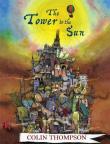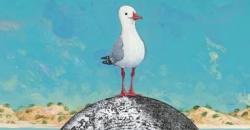AustLit
The material on this page is available to AustLit subscribers. If you are a subscriber or are from a subscribing organisation, please log in to gain full access. To explore options for subscribing to this unique teaching, research, and publishing resource for Australian culture and storytelling, please contact us or find out more.
Latest Issues
AbstractHistoryArchive Description
Despairing because the air has become so filthy that it blocks the sun's rays, the richest man in the world decides to use his money to build a tower so that his grandson can experience the sun as it once was.
Publication Details of Only Known VersionEarliest 2 Known Versions of
Works about this Work
-
y
 Reading The Environment : Narrative Constructions Of Ecological Subjectivities In Australian Children's Literature
Kelvin Grove
:
2009
Z1792849
2009
single work
thesis
Ways in which humans engage with the environment have always provided a rich source of material for writers and illustrators of Australian children's literature. Currently, readers are confronted with a multiplicity of complex, competing and/or complementing networks of ideas, theories and emotions that provide narratives about human engagement with the environment at a particular historical moment. This study examines how a representative sample of Australian texts (19 picture books and 4 novels for children and young adults published between 1995 and 2006) constructs fictional ecological subjects in the texts, and offers readers ecological subject positions inscribed with contemporary environmental ideologies. The conceptual framework developed in this study identifies three ideologically grounded positions that humans may assume when engaging with the environment. None of these positions clearly exists independently of any other, nor are they internally homogeneous. Nevertheless they can be categorised as: (i) human dominion over the environment with little regard for environmental degradation (unrestrained anthropocentrism); (ii) human consideration for the environment driven by understandings that humans need the environment to survive (restrained anthropocentrism); and (iii) human deference towards the environment guided by understandings that humans are no more important than the environment (ecocentrism). iv The transdisciplinary methodological approach to textual analysis used in this thesis draws on ecocriticism, narrative theories, visual semiotics, ecofeminism and postcolonialism to discuss the difficulties and contradictions in the construction of the positions offered. Each chapter of textual analysis focuses on the construction of subjectivities in relation to one of the positions identified in the conceptual framework. According to the analysis undertaken, the focus texts convey the subtleties and complexities of human engagement with the environment and advocate ways of viewing and responding to contemporary unease about the environment. The study concludes that these ways of viewing and responding conform to and/or challenge dominant socio-cultural and political-economic opinions regarding the environment. This study, the first extended work of its kind, makes an original contribution to ecocritical study of Australian children's literature. By undertaking a comprehensive analysis of how texts for children represent human engagement with the environment at a time when important environmental concerns pose significant threats to human existence, Massey contributes new knowledge to an area of children's literature research that to date has been significantly under-represented.
Reading The Environment : Narrative Constructions Of Ecological Subjectivities In Australian Children's Literature
Kelvin Grove
:
2009
Z1792849
2009
single work
thesis
Ways in which humans engage with the environment have always provided a rich source of material for writers and illustrators of Australian children's literature. Currently, readers are confronted with a multiplicity of complex, competing and/or complementing networks of ideas, theories and emotions that provide narratives about human engagement with the environment at a particular historical moment. This study examines how a representative sample of Australian texts (19 picture books and 4 novels for children and young adults published between 1995 and 2006) constructs fictional ecological subjects in the texts, and offers readers ecological subject positions inscribed with contemporary environmental ideologies. The conceptual framework developed in this study identifies three ideologically grounded positions that humans may assume when engaging with the environment. None of these positions clearly exists independently of any other, nor are they internally homogeneous. Nevertheless they can be categorised as: (i) human dominion over the environment with little regard for environmental degradation (unrestrained anthropocentrism); (ii) human consideration for the environment driven by understandings that humans need the environment to survive (restrained anthropocentrism); and (iii) human deference towards the environment guided by understandings that humans are no more important than the environment (ecocentrism). iv The transdisciplinary methodological approach to textual analysis used in this thesis draws on ecocriticism, narrative theories, visual semiotics, ecofeminism and postcolonialism to discuss the difficulties and contradictions in the construction of the positions offered. Each chapter of textual analysis focuses on the construction of subjectivities in relation to one of the positions identified in the conceptual framework. According to the analysis undertaken, the focus texts convey the subtleties and complexities of human engagement with the environment and advocate ways of viewing and responding to contemporary unease about the environment. The study concludes that these ways of viewing and responding conform to and/or challenge dominant socio-cultural and political-economic opinions regarding the environment. This study, the first extended work of its kind, makes an original contribution to ecocritical study of Australian children's literature. By undertaking a comprehensive analysis of how texts for children represent human engagement with the environment at a time when important environmental concerns pose significant threats to human existence, Massey contributes new knowledge to an area of children's literature research that to date has been significantly under-represented.
-
Untitled
1997
single work
review
— Appears in: Magpies : Talking About Books for Children , March vol. 12 no. 1 1997; (p. 30)
— Review of The Tower to the Sun 1996 single work picture book -
Untitled
1997
single work
review
— Appears in: Reading Time : The Journal of the Children's Book Council of Australia , February vol. 41 no. 1 1997; (p. 15)
— Review of The Tower to the Sun 1996 single work picture book
-
Untitled
1997
single work
review
— Appears in: Reading Time : The Journal of the Children's Book Council of Australia , February vol. 41 no. 1 1997; (p. 15)
— Review of The Tower to the Sun 1996 single work picture book -
Untitled
1997
single work
review
— Appears in: Magpies : Talking About Books for Children , March vol. 12 no. 1 1997; (p. 30)
— Review of The Tower to the Sun 1996 single work picture book -
y
 Reading The Environment : Narrative Constructions Of Ecological Subjectivities In Australian Children's Literature
Kelvin Grove
:
2009
Z1792849
2009
single work
thesis
Ways in which humans engage with the environment have always provided a rich source of material for writers and illustrators of Australian children's literature. Currently, readers are confronted with a multiplicity of complex, competing and/or complementing networks of ideas, theories and emotions that provide narratives about human engagement with the environment at a particular historical moment. This study examines how a representative sample of Australian texts (19 picture books and 4 novels for children and young adults published between 1995 and 2006) constructs fictional ecological subjects in the texts, and offers readers ecological subject positions inscribed with contemporary environmental ideologies. The conceptual framework developed in this study identifies three ideologically grounded positions that humans may assume when engaging with the environment. None of these positions clearly exists independently of any other, nor are they internally homogeneous. Nevertheless they can be categorised as: (i) human dominion over the environment with little regard for environmental degradation (unrestrained anthropocentrism); (ii) human consideration for the environment driven by understandings that humans need the environment to survive (restrained anthropocentrism); and (iii) human deference towards the environment guided by understandings that humans are no more important than the environment (ecocentrism). iv The transdisciplinary methodological approach to textual analysis used in this thesis draws on ecocriticism, narrative theories, visual semiotics, ecofeminism and postcolonialism to discuss the difficulties and contradictions in the construction of the positions offered. Each chapter of textual analysis focuses on the construction of subjectivities in relation to one of the positions identified in the conceptual framework. According to the analysis undertaken, the focus texts convey the subtleties and complexities of human engagement with the environment and advocate ways of viewing and responding to contemporary unease about the environment. The study concludes that these ways of viewing and responding conform to and/or challenge dominant socio-cultural and political-economic opinions regarding the environment. This study, the first extended work of its kind, makes an original contribution to ecocritical study of Australian children's literature. By undertaking a comprehensive analysis of how texts for children represent human engagement with the environment at a time when important environmental concerns pose significant threats to human existence, Massey contributes new knowledge to an area of children's literature research that to date has been significantly under-represented.
Reading The Environment : Narrative Constructions Of Ecological Subjectivities In Australian Children's Literature
Kelvin Grove
:
2009
Z1792849
2009
single work
thesis
Ways in which humans engage with the environment have always provided a rich source of material for writers and illustrators of Australian children's literature. Currently, readers are confronted with a multiplicity of complex, competing and/or complementing networks of ideas, theories and emotions that provide narratives about human engagement with the environment at a particular historical moment. This study examines how a representative sample of Australian texts (19 picture books and 4 novels for children and young adults published between 1995 and 2006) constructs fictional ecological subjects in the texts, and offers readers ecological subject positions inscribed with contemporary environmental ideologies. The conceptual framework developed in this study identifies three ideologically grounded positions that humans may assume when engaging with the environment. None of these positions clearly exists independently of any other, nor are they internally homogeneous. Nevertheless they can be categorised as: (i) human dominion over the environment with little regard for environmental degradation (unrestrained anthropocentrism); (ii) human consideration for the environment driven by understandings that humans need the environment to survive (restrained anthropocentrism); and (iii) human deference towards the environment guided by understandings that humans are no more important than the environment (ecocentrism). iv The transdisciplinary methodological approach to textual analysis used in this thesis draws on ecocriticism, narrative theories, visual semiotics, ecofeminism and postcolonialism to discuss the difficulties and contradictions in the construction of the positions offered. Each chapter of textual analysis focuses on the construction of subjectivities in relation to one of the positions identified in the conceptual framework. According to the analysis undertaken, the focus texts convey the subtleties and complexities of human engagement with the environment and advocate ways of viewing and responding to contemporary unease about the environment. The study concludes that these ways of viewing and responding conform to and/or challenge dominant socio-cultural and political-economic opinions regarding the environment. This study, the first extended work of its kind, makes an original contribution to ecocritical study of Australian children's literature. By undertaking a comprehensive analysis of how texts for children represent human engagement with the environment at a time when important environmental concerns pose significant threats to human existence, Massey contributes new knowledge to an area of children's literature research that to date has been significantly under-represented.
Last amended 20 Oct 2016 13:28:22
Export this record




